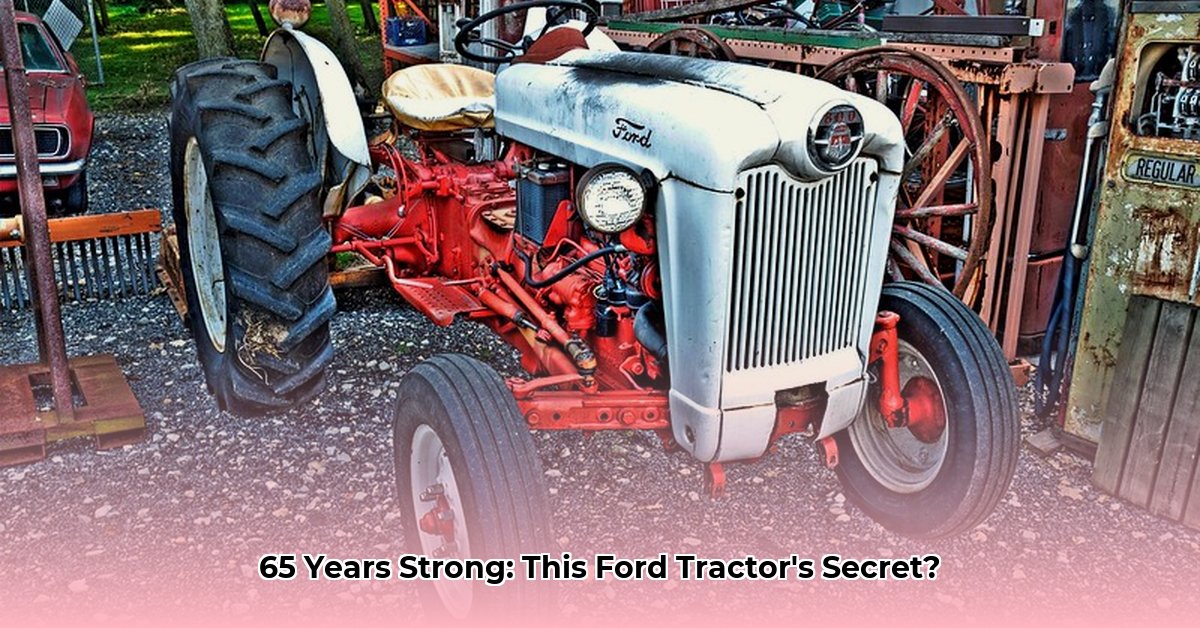
57 Ford Tractor: A 65-Year Legacy of Sustainable Farming
The Peden family's 1957 Ford 960 tractor isn't just a machine; it's a living testament to family legacy, resourceful farming, and the surprising relevance of vintage equipment in a modern, sustainable world. For over six decades, this trusty workhorse has tilled their fields, a symbol of enduring quality in an era of disposability. How many possessions do you have that can boast a 65-year lifespan, and continue to perform reliably? This isn't some museum piece; it's a working part of the Peden family farm operation. For more on Ford tractors, check out this useful resource.
This incredible longevity raises a compelling question: Is the constant pursuit of the newest technology always the most sustainable or economical approach to farming?
The Peden's 1957 Ford 960 proves that it isn't. Their commitment to maintaining this vintage tractor isn't just about sentimentality; it is a financially astute and environmentally conscious decision. The tractor's ongoing usefulness significantly reduces the need for resource-intensive manufacturing and the disposal of outdated machinery, a testament to practical sustainability.
More Than Just Horsepower: The 1957 Ford 960
Forget GPS, auto-steering, and climate-controlled cabs. The 1957 Ford 960 is refreshingly simple. Its straightforward design makes maintenance and repairs accessible. While lacking the speed and sophisticated features of modern tractors, its dependability shines through. This underscores a critical point: sustainable farming isn't solely about the latest technology; it’s about maximizing the lifespan and utility of existing resources.
The Pedens' dedication to regular maintenance, including engine overhauls, ensures the 960’s continued functionality. "It's about respecting the machine and its enduring value," says John Peden, reflecting on the family's steadfast maintenance routine. This isn't merely about financial savings; it's a testament to their deep appreciation for the tractor's legacy.
The Surprisingly Smart Economics of a Vintage Tractor
A new tractor represents a considerable investment. The purchase price is substantial, and ongoing fuel, maintenance, and eventual replacement costs add up significantly. The Pedens' 1957 Ford, however, presents a compelling counterpoint. While the initial cost (approximately $27,000 in today's money, adjusted for inflation) might seem high, the consistently lower operational costs have proven the machine’s long-term value. The family has effectively recouped its investment many times over.
Adding to its economic appeal, the resale value of well-maintained vintage tractors often remains surprisingly high—a testament to their durability and timeless engineering. This highlights the potential for long-term financial benefits from prioritizing durable equipment that requires minimal replacement.
Beyond the Fields: A Living Piece of History
The Peden's 1957 Ford isn’t just a farm implement; its a community treasure. Regularly featured at the annual Children's Farm Festival, it connects generations, showcasing agricultural history and fostering appreciation for the past. The tractor serves as a powerful symbol, educating children about food origins while demonstrating the enduring value of preserving our heritage.
This isn't simply about nostalgia; it's about responsible resource management. The extended use of this vintage machine significantly reduces the environmental impact associated with constant manufacturing and disposal of modern equipment.
Sustainable Farming: It’s Not Just a Trend
The 1957 Ford embodies sustainable practices. Its extended lifespan directly reduces resource consumption in manufacturing and waste from equipment disposal, embodying a circular economy model. The Pedens' approach prioritizes responsible resource use over the cycle of constant consumption.
This extends beyond the machine itself. The skills involved in maintaining and repairing this vintage tractor support local mechanics and preserve traditional knowledge, creating a local sustainable ecosystem.
Lessons for Everyone: Practical Steps Towards Sustainable Agriculture
The Pedens' experience offers valuable lessons for various stakeholders:
- Reduce Equipment Replacement Costs: Prioritize maintenance and repair over immediate replacement.
- Invest in Preventative Maintenance: Implement a comprehensive schedule of regular inspections and servicing.
- Promote Durable Equipment: Encourage manufacturers to design longer-lasting, easily repairable machines.
- Preserve Agricultural Skills: Integrate vintage equipment into educational programs to preserve traditional knowledge.
How to Reduce Farm Equipment Replacement Costs Through Preventative Maintenance
The Peden family's success with their 1957 Ford 960 underscores the importance of proactive maintenance. Their dedication to regular oil changes, inspections, and prompt repairs is a masterclass in extending equipment life. This wasn't just about cost savings; it reflects a profound respect for their machinery and its place in their family history.
Preventative Maintenance: Beyond Oil Changes
Preventative maintenance isn't limited to oil changes; it's a holistic approach. Think of it as regular health checks for your tractor, addressing issues before they become major problems:
- Regular Inspections: Daily or post-use visual checks for leaks, wear, and unusual noises.
- Scheduled Maintenance: Adhere to the manufacturer's recommended service intervals.
- Component Replacement: Replace worn parts proactively to prevent catastrophic failures.
- Environmental Responsibility: Use eco-friendly lubricants and proper waste disposal methods.
Technology's Role in Modern Maintenance
Modern technology enhances preventative maintenance. Telematics systems monitor tractor performance, and predictive maintenance software analyzes this data to anticipate potential problems. This allows for proactive servicing, minimizing downtime and maximizing equipment longevity. However, adopting these technologies requires investment and training.
Balancing Tradition and Technology
The Pedens' approach successfully blends tradition and technology. Their dedication to quality craftsmanship, coupled with the adoption of appropriate modern tools, exemplifies an optimal approach to maintaining farm equipment.